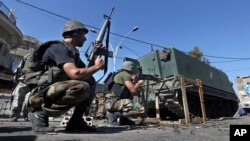U.S. support for the Lebanese Armed Forces is moving forward with new urgency, as Beirut battles to push back Islamic extremist groups that have launched unrelenting attacks along the frontier with Syria.
On Wednesday, the Lebanese army conducted live-fire demonstrations using advanced missiles supplied by the United States in the troubled Baalbek region in the east, where army troops have endured repeated attacks by Islamic extremist groups, including Islamic State and the al-Qaida-linked Nusra Front.
The military exercises followed a U.S. State Department announcement that it had approved the possible sale to Lebanon of six A-29 Super Tucano aircraft and associated equipment, parts and logistical support, worth an estimated $462 million.
The State Department said the aircraft would help provide Lebanon with airborne capabilities needed to maintain internal and border security against threats posed by terror groups.
Missiles, launchers
In late May, the U.S. delivered 200 TOW-II missiles and launchers to Lebanon. The estimated $10 million cost was covered by the United States and Saudi Arabia.
The U.S. has long provided support to bolster the Lebanese army’s capability to defend its own territory and borders, but the pace has ramped up since the rise of Islamic State and other Islamic extremist groups in neighboring Syria.
“Now you have a country that is on the fast track, acquiring more munitions, more capability, a capability they desperately need,” said researcher Aram Nerguizian, a senior fellow at the Center for Strategic and International Studies.
Lebanon’s limited air capability has made it difficult to gather intelligence and conduct surveillance and reconnaissance missions, as ground troops battle extremist groups that use constantly changing strategies and tactics.
“When you have boots on the ground, whether it’s conventional or special forces, you need to have that confidence that you have protection in the air,” said Nerguizian.
Soldiers captured, killed
The militant groups repeatedly ambush, kill and capture Lebanese soldiers. In August, the Nusra Front and Islamic State groups seized more than 24 soldiers. Four have been killed, two of them by beheading. The rest of the soldiers remain in captivity.
The groups’ brutality and steady march across Iraq and Syria are reasons why Lebanese officials swiftly ended a years-old debate on the acquisition of U.S. military equipment and supplies, said Nerguizian. “There was no longer the luxury to have these long acquisition conversations,” he said.
U.S. State Department spokesman Jeff Rathke said the delivery of U.S. military support did not reflect a change in the U.S. strategy to combat Islamic State.
“These are part of our long-term engagement with Lebanon and our support for the Lebanese government and the Lebanese armed forces,” the spokesman said. “Naturally, they face pressures, including in their region, and so we constantly remain in dialogue with Lebanon in order to make sure that we are responsive to their requirements.”




